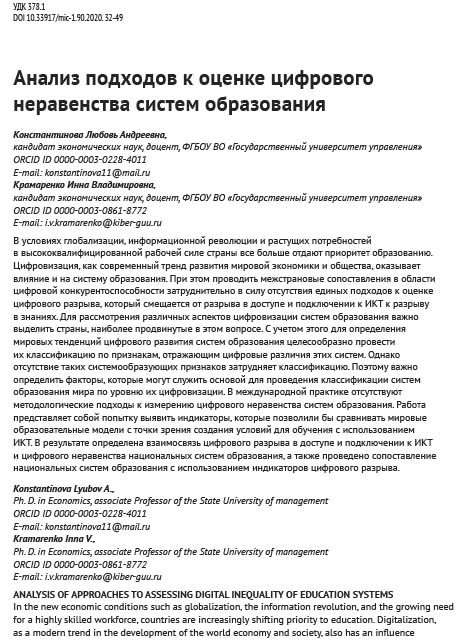Analysis approaches to assessing digital inequality of education systems
DOI: 10.33917/mic-1.90.2020.32-49.
In the new economic conditions such as globalization, the information revolution, and the growing need for a highly skilled workforce, countries are increasingly shifting priority to education. Digitalization, as a modern trend in the development of the world economy and society, also has an influence on the education system. However, it is difficult to make cross-country comparisons in the area of digital competitiveness because there are no common approaches to assessing the digital divide, which is shifting from the gap in access and connectivity to ICT to the knowledge gap. To consider various aspects of digitalization of education systems, it is important to identify the countries that are most advanced in this issue. With this in mind, to determine global trends of digital education it is advisable to carry out their classification by characteristics reflecting the differences between these digital systems. However, the absence of such system-forming features makes classification difficult. Therefore, it is important to identify factors that can serve as a basis for classifying the world’s education systems by their level of digitalization. There are no methodological approaches to measuring digital inequality in education systems in international practice. This work is an attempt to identify indicators that would allow us to compare global educational models in terms of creating conditions for learning using ICT. As a result, the relationship between the digital gap in access and connection to ICT and the digital inequality of national education systems is determined, and the comparison of national education systems using digital gap indicators is carried out.
References:
|
1. Strategies World Bank Group [Electronic resource]. – Mode of access: https://openknowledge.worldbank.org/bitstream/handle/10986/16093/32813_ebook.pdf?sequence (date accessed: 19.12.2019). 2. Training for everyone. Investment in people’s knowledge and skills to promote development (world Bank group Educational strategy, 2020) [Electronic resource]. – Mode of access: https://siteresources.worldbank.org/EDUCATION/Resources/ESSU/463292-1306181142935/Russian_Exec_Summary_2020_FINAL.pdf (date accessed: 19.12.2019). 3. Human development index [Electronic resource]. – Mode of access: https://nonews.co/directory/lists/countries/index-human (date of access: 10.11.2019). 4. Top 20 Countries with the Best Educational System in the 2019 World [Electronic resource]. – Mode of access: https://www.currentschoolnews.com/education-news/best-educational-system-in-the-world/. (date accessed: 06.11.2019). 5. 2019 World Best Education Systems, 3rd Quarter Rankings (NJ MED Ranking) [Electronic resource]. – Mode of access: https://worldtop20.org/worldbesteducationsystem (date accessed: 07.11.2019). 6. Rating of the effectiveness of national education systems [Electronic resource]. – Mode of access: https://gtmarket.ru/ratings/global-index-of-cognitive-skills-and-educational-attainment/info (date accessed: 08.11.2019). 7. Digital divide by country [Electronic resource]. – Mode of access: https://en.wikipedia.org/wiki/Digital_divide_by_country. (date accessed: 08.11.2019). 8. Solovieva Yu. N., Feigin G. F. trends in the development of ICT in Russia: the phenomenon of information inequality in the regions / / Bulletin of the Institute of Economics of the Russian Academy of Sciences. 2017. № 5. pp. 79-94. 9. Bortvin D. O., Lozba E. V., Khasanshin R. R. Assessment of innovative potential through the prism of indicators of development of the information society and the knowledge economy / / Bulletin of international organizations. 2010. № 1 (27). pp. 33-50. 10. Website of the Ministry of digital development, communications and mass communications of the Russian Federation. Information and communication technology development index (ICT Development Index) [Electronic resource]. – Access mode: https://digital.gov.ru/ru/activity/statistic/rating/indeks-razvitiya-informacionno-kommunikacionnyh-tehnologij-ict-development-index/#tabs/Compare:Place (date accessed 11.11.2019). 11. ICT Development Index. 2017 [Electronic resource]. – Mode of access: https://www.itu.int/net4/ITU-D/idi/2017/index.html#idi2017economycard-tab&ISL. (date accessed: 12.11.2019). 12. Bhaskar Chakravorti, Ajay Bhalla, Ravi Shankar Chaturvedi. «60 Countries’, Digital Competitiveness, Indexed DEI» [Electronic resource]. – Mode of access: https://hbr.org/2017/07/60-countries-digital-competitiveness-indexed. (date accessed: 12.11.2019). 13. Dimension of digital trust. Index DEI [Electronic resource]. – Mode of access: https://www.mastercard.us/en-us/governments/insights-research/digital-evolution-index/digital-trust.html (date accessed: 12.11.2019). 14. Rating of countries in the world by the level of ICT development (IMD). Humanitarian encyclopedia [Electronic resource]. – Mode of access: https://gtmarket.ru/ratings/ict-development-index/ict-development-index-info (date accessed: 13.11.2019). 15. Digital IMD World competitiveness ranking 2019 [Electronic resource]. – Mode of access: https://www.imd.org/wcc/world-competitiveness-center-rankings/world-digital-competitiveness-rankings-2019/ (accessed: 13.11.2019). 16. Development trends of the education in Russia under GCI digital economy [Electronic resource]. – Mode of access: http://www.revistaespacios.com/a18v39n30/a18v39n30p23.pdf (date accessed: 14.11.2019). 17. 2019 Global Connectivity Index GCI [Electronic resource]. – Mode of access: https://www.huawei.com/minisite/gci/en/index.html (date accessed: 14.11.2019). 18. Global Connectivity Index. GCI [Electronic resource]. – Mode of access: https://en.wikipedia.org/wiki/Global_Connectivity_Index (date accessed: 15.11.2019). 19. McKinsey: digitalization can increase the share of Russia’s GDP to 34%, 2017 [Electronic resource]. – Mode of access: https://www.cossa.ru/news/167428/ (date accessed: 16.11.2019). 20. Burdenko E. V. Ratings and indexes that assess the development of the knowledge economy / / Creative economy. 2019. Vol. 13. № 5. pp. 897-910. 21. Official website of «ROCIT» [Electronic resource]. – Mode of access: https://rocit.ru/ (date accessed: 24.12.2019). 22. Official website of the analytical center «NAFI» [Electronic resource]. – Mode of access: https://nafi.ru/ ( date accessed: 24.12.2019). 23. The price of inequality: How the stratification of society threatens our future / Joseph Stiglitz. Christmas E.]. Moscow: Eksmo, 2015. 255 p.; ISBN 978-5-699-72540-3. 24. Huawei news [Electronic resource]. – Mode of access: https://www.huawei.com/ru/press-events/news/ru/2019/huawei_global_connectivity_index_2019 (date accessed: 17.01.2020). 25. The Digital Divide and Educational Equity. ACT Research&Center for equity in learning. August 2018. [Electronic resource]. – Mode of access: https://www.act.org/content/dam/act/unsecured/documents/R1698-digital-divide-2018-08.pdf (date accessed: 26.01.2020). 26. Terens Lee. Digital Divide in Education. April 2018. [Electronic resource]. – Mode of access: https://www.eqoptech.org/publications/2018/4/6/the-digital-divide-in-education (date accessed: 26.01.2020). 27. SABER ICT Framework Paper [Electronic resource]. – Access mode: http://wbgfiles.worldbank.org/documents/hdn/ed/saber/supporting_doc/Background/ICT/112899-WP-SABER-ICTframework-SABER-ICTno01.pdf (date accessed 26.01.2020). 28. Human development index [Electronic resource]. – Mode of access: https://gtmarket.ru/ratings/human-development-index(date accessed: 27.01.2020).
|



